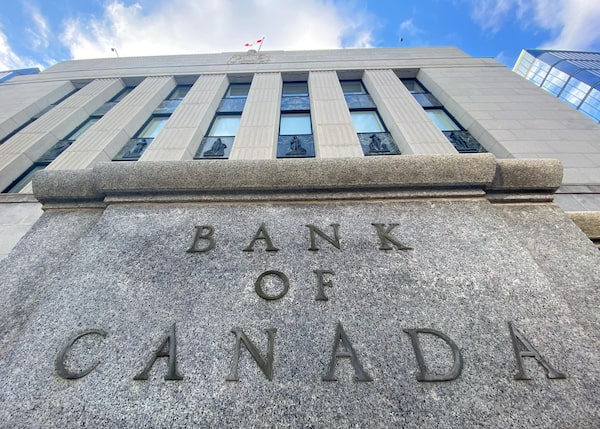
Before the April rate hike, the central bank had not announced a half-point increase for two decades.Adrian Wyld/The Canadian Press
The Bank of Canada is expected to announce another oversized interest rate increase this week, part of its effort to push Canadian borrowing costs rapidly higher in the hope of slowing the pace of consumer price growth.
The central bank is in the middle of its fastest rate hike cycle in decades. After keeping its benchmark interest rate near zero for two years, the bank’s governing council announced back-to-back rate hikes in March and April – the second being an unusually large half-percentage-point move.
Bay Street forecasters widely expect the bank to follow up with another half-point move on Wednesday. That would bring the bank’s benchmark rate up to 1.5 per cent, just a quarter point below the prepandemic level.
How central bankers lost their grip on inflation
A succession of supersized moves would be extraordinary by historical standards. Before the April rate hike, the central bank had not announced a half-point increase for two decades. It typically moves in quarter-point increments.
But Canada’s central bankers seem to be feeling a sense of urgency. The annual rate of inflation hit a new 31-year high of 6.8 per cent in April – more than three times the bank’s 2-per-cent target – and forecasters expect the consumer price index to keep pushing higher in the coming months as a result of surging oil and other commodity prices.
Inflation is also broadening out to a wider range of goods and services, making it harder for Canadians to avoid. And it is increasingly being driven by domestic factors.
“We are confronted with an economy that is showing clear signs of overheating, very tight labour markets and this perfect inflationary storm of global events and preference shifts [in consumer spending],” Bank of Canada deputy governor Toni Gravelle said in a speech earlier this month.
“Simply put, with demand running ahead of the economy’s capacity, we need higher interest rates to cool domestic inflation.”
Central bank officials have said they intend to get the benchmark rate to a “neutral” position – meaning an interest rate level that neither stimulates nor holds back the economy – of between 2 per cent and 3 per cent relatively quickly. Whether the bank stops there or keeps pushing higher will depend on how the economy reacts to higher borrowing costs. In this, the bank will be paying particularly close attention to the housing market.
There are already signs that the real estate sector is slowing in response to interest rate increases. The number of home sales across the country fell 12.6 per cent from March to April on a seasonally adjusted basis, while the home price index slid 0.6 per cent, according to the Canadian Real Estate Association.
“Anyone with a variable rate mortgage should understand what their payment will be with a 50-basis-point increase next week, and they should budget for additional rate increases totalling 1-2 per cent for the remainder of the year,” James Laird, co-founder of Ratehub.ca and president of CanWise Financial, a mortgage brokerage, said in an e-mailed statement.
“Fixed rates have already increased by 1.75-2 per cent, because bond yields have been pricing in the anticipated Bank of Canada rate increases,” he added.
Mr. Gravelle warned in his speech that interest rate increases could have a greater impact on the Canadian economy than they did in the past “because highly indebted households will face high debt-servicing costs and will likely reduce household spending more than they would have otherwise.”
Housing market concerns could play a bigger role in the Bank of Canada’s decision-making as it gets farther along in its rate hike cycle. For now, however, the bank’s main task is sounding tough on inflation, according to Andrew Kelvin, chief Canada strategist at Toronto Dominion Bank.
“If the bank spends too much time focusing on the headwinds facing the economy (slower housing activity, crumbling consumer confidence), markets may come to believe that the bank is unwilling to bring inflation under control, causing inflation expectations to become unanchored and requiring a more painful tightening cycle,” he wrote in a note to clients.
There was some earlier speculation that the bank might move more than 50 basis points this week. But Bank of Canada Governor Tiff Macklem seemed to rule this out in an appearance before Parliament last month, saying that such a move would be “very unusual.”
Your time is valuable. Have the Top Business Headlines newsletter conveniently delivered to your inbox in the morning or evening. Sign up today.
 Mark Rendell
Mark Rendell